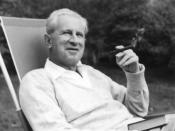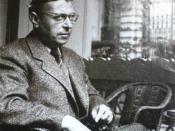Topic: State the main points of Marcuse's critique of Sartre, and consider the grounds on which Sartre might defend himself. Could Sartre succeed?
Herbert Marcuse's critique of Sartre in Existentialism: Remarks on Jean-Paul Sartre'sL'Etre et le Neant is based on the claim that Sartre's method is ontologically impure, in that its account of the nature of consciousness is in fact abstracted from historical factors. This criticism was not specific to Sartre. Marcuse's approach is rooted firmly in the so-called "critical theory" developed in the thirties by Max Horkheimer's Institute for Social Research, of which Marcuse was a member prior to World War Two. Horkheimer was concerned with providing a progressive response to what he saw as a growing recourse to antirationalist philosophies. He believed that philosophy need not give up on rationalism, but that in order to bring it up to date, "a materialist account of its nature, condition, and limits" must be provided.
In addition, he believed in preserving a "strong distinction between true and false consciousness."
In this vein, Marcuse takes issue with Sartre's account of "being-for-others," which is based on a flip-flopping between two modes of interaction. As beings in a social world, according to Sartre, an essential part of who we are has an independent existence, in the form of other people's perceptions and opinions of us. We can either seek to dominate the other's consciousness or be dominated ourselves, but never both, as
/*
the other can only exist for us in two forms: if I experience him with evidence, I fail to know him [and hence myself]; if I know him, if I act upon him, I only reach his being-as-object and his probable existence in the midst of the world.
*/
Marcuse points out that this conflict takes the same form as...


